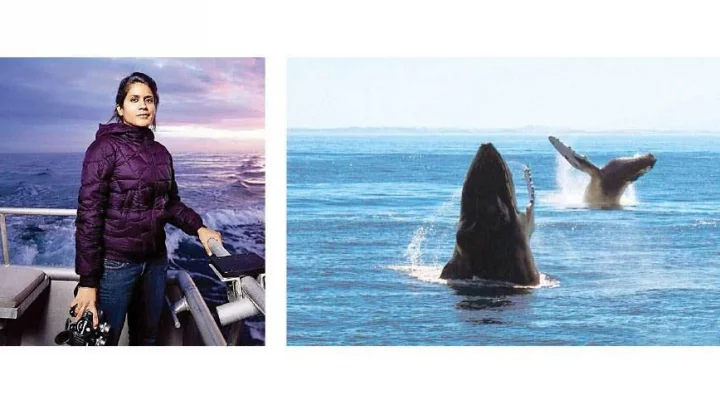
Why and how did you become involved in the courageous profession of marine biology? What was your original inspiration?
When I was young, my parents would bring home secondhand copies of National Geographic magazines. As I flipped through the pages, I started to imagine myself in the place of all those adventurers. That’s where my dream to become an adventurer scientist first began. I wanted to explore places no one else could ever go to and discover things that others were yet to discover. This all began at the age of six. As I grew up I grew an affinity for animals, understanding their behaviour and water. I was a swimmer and discovered that water, of any form, was my element. I guess all these ingredients came together and I very organically moved on the path of becoming a marine biologist.
In different interviews, you often mention Sir Arthur Clarke. Why?Arthur C Clarke moved to Sri Lanka and did a lot of wreck diving there over the years. I was lucky in that he would come to the same swimming club I used to train at. I spent many afternoons listening to him talk about the deep blue and the things he saw. I still distinctly remember the day he told me that he was diving off southern Sri Lanka once and saw this big piece of never ending skin swimming under him. He never found out what it was, but at that moment I knew I wanted to.
Please tell me more about your work and especially your research on unorthodox whales. I pioneered this research on blue whales in the Northern Indian Ocean because I was curious about why a population of the largest animal to ever roam the planet, would choose to remain in warm tropical waters year-round. Typically, large whales undertake long range migrations between cold feeding areas and warm breeding and calving areas. But in this situation we were seeing these whales year round along Sri Lanka’s coastline and we see evidence of feeding, breeding and calving. So my project began out of curiosity and also concern. Concern because the south coast of Sri Lanka is one of the biggest shipping lanes in the world, and I realised that the overlap between the whales and the ships could not be a good thing. And I was right, it turned out. The biggest threat to these whales is ship-strike, where whales get hit by ships and killed. I documented a few cases and submitted a report to the International Whaling Commission (IWC) as a result of which the IWC started communicating with the government of Sri Lanka and urging them to realise that this is a population in urgent need of research and conservation action. Right now, along with my team, I am working on providing some suitable recommendations on how to reduce this threat to the whales with minimal disruption to the shipping industry.
How do you feel about the world’s largest blue whale colony in Sri Lanka?The fact that it is the world’s largest blue whale colony is inaccurate. Someone renamed this Channel 7 news piece before they uploaded it on youtube and I guess it has misled a lot of people into believing that this is indeed the world’s largest colony. We don’t actually know how many individuals there are in this colony. We are currently working on generating a population estimate.
What kind of challenges have you faced in your work over the years? I have faced various challenges along the way – I have wrestled with government officials ignoring me because I was too young and female; I have dealt with foreign scientists disregarding my work because the equipment I used was too basic. Of course, when I reminded them that the foundation of all our scientific knowledge was built using the most basic equipment, they had no choice but to nod in approval. I have dealt with having my work overlooked in my own country in favour of the work of foreign scientists; I have dealt with boat breakdowns, equipment failure; I have dealt with the madness of not having enough funds to run a field season. The challenges are endless but to me, they are there to help us be our best selves. I work hard to figure out how to make those challenges work for me rather than against me, and that makes all the difference.
